Advantages of using Linux
We have over the years become quite accustomed to the term: Operating System (OS), the interface that runs on our laptops, smartphones, tablets, and the rest. One such operating system is Linux. Linux is similar to other popular operating systems like Windows, or the Mac OS. Let’s see the advantages of using Linux in a nutshell.

Usage varies on personal choices and needs; however, it is always exciting to cognize what these technologies have to offer, and what makes them stand apart. Let’s check out a few merits of the Linux operating system:
Open Source
One of the most frequently mentioned benefits of the Linux (opens in a new tab) operating system is that it is open source. This gives anyone the right to edit its source code and thus develop it for various purposes. Being open-source helps developers and companies to collaborate and diversify the design process beyond a single individual, offering a wide array of options to choose from.
Flexibility
An advantage that is in conjunction with its open-source nature is flexibility. It doesn’t matter whether you are experienced or an entry-level coder, you can modify it the way you want, the way you want it to perform. You don’t have to install all the components, just the ones that you need.
Read More: Linux Command Cheatsheet for Beginners
Low Cost Solution
Low-cost may not be the word to describe Linux. It is, in fact, free to download, along with a majority of its library, software updates, and other server applications. Its licenses come under the GNU General Public License.
This proves to be a huge bargain over the other operating software options, as the likes of Windows and Mac OS are pretty expensive. So you don’t have to bother too much about the budget and can start right away.
High Security
You cannot skip this part of the Linux operating system. Vast majorities of organizations and users rely on high-security systems to protect their data and information. Linux doesn’t compromise on safety and continues to be one of its major selling points in the market.
With a huge global open-source community working on the Linux line of software, it is subject to thorough scrutiny and subsequent rectifications, along with many other underlying factors such as the vast diversity and customizations available due to its open-source nature, all of which contribute to the high levels of safety and protection. Thus security is one of the biggest concerns and one of the major advantages of using Linux.
Read More: 5 Future proof Tech skills to Learn (opens in a new tab)
Convenient and Reliable
A seamless performing technology is everyone’s desire. To keep your workflow smooth and sleek, it is necessary to avoid hindrances or obstacles of any sort. Linux is quite easy to install, with no hardware requirements or prerequisites, no need for any reboots post the installation of other applications and services.
It can run on any hardware; be it for high-end or low-end applications, whether you are an experienced professional or a novice user, you are not confined to the system capabilities while using Linux platforms.
High Performance
Performance capabilities of Linux are vast: whether you are working on heavy projects, or for light uses, Linux is more than capable of adapting to the workflow. It hardly slows down or hangs up while performing hefty tasks, along with the added benefits of multi-tasking, and greater network functionalities.
Linux is properly efficient as it can effortlessly perform even when your disk space is running low, and can also be implemented on outdated computers and devices, making them useful in the process.
As you can see, Linux is a viable choice for any user, and quite the option to bypass all your limitations. The popularity and usage of the series are ever-increasing and would be a remarkable shift in direction as you make a move into the world of Linux.
